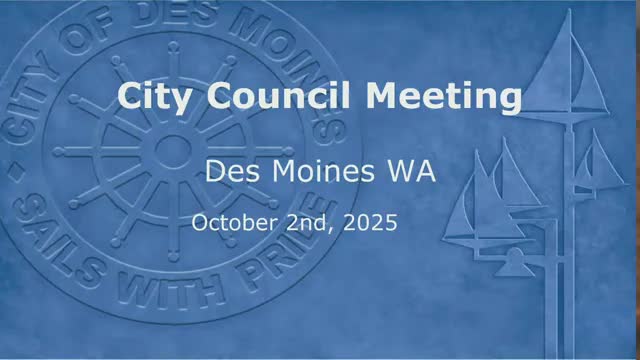Council hears legislative outlook for 2026; directs staff to refine priorities on public safety, ferries and funding
October 03, 2025 | Des Moines City, King County, Washington
This article was created by AI summarizing key points discussed. AI makes mistakes, so for full details and context, please refer to the video of the full meeting. Please report any errors so we can fix them. Report an error »

Anthony Hempstead, the city’s legislative advocate, briefed the Committee of the Whole on Oct. 2 about the policy and budget environment for the 2026 Washington Legislature and solicited council direction on priority topics.
Hempstead said 2026 is the second year of a two‑year biennium and will be a 60‑day short session. "Once that session starts, 60 days goes very, very quickly," he told the council, explaining that a supplemental budget will be smaller and that the state’s budget outlook has deteriorated since April.
Hempstead reviewed items the city pursued in 2025 — including capital funding for the Marina Steps and advocacy that brought an air-quality monitor to the city — and said many bills and requests that did not pass in the last session will carry forward. He urged the council to prioritize a concise set of asks because the short session leaves limited time for new appropriations.
Council members discussed a range of topics and gave staff direction on which issues to carry forward and how to frame them. Topics discussed included expanding permissible uses and geographic access for traffic‑ and sound‑monitoring cameras (councilors signaled interest in broader automation tools than currently allowed), support for Mosquito Fleet passenger‑only ferries and related grant funding, historic‑preservation language, unfunded‑mandate concerns and continuing to monitor proposals to lift or modify the one‑percent property tax cap.
On funding strategy, several council members said the city should remain aligned with other municipal advocacy efforts and keep the property‑tax cap issue on the radar even if the administration does not recommend an immediate capital ask for 2026. Several members emphasized opposing new unfunded mandates that would shift costs to cities without state funding.
Hempstead and staff will draft refined legislative language and return to the council for approval; they said they will also work with regional partners and the city’s legislative delegation when appropriate.
Hempstead said 2026 is the second year of a two‑year biennium and will be a 60‑day short session. "Once that session starts, 60 days goes very, very quickly," he told the council, explaining that a supplemental budget will be smaller and that the state’s budget outlook has deteriorated since April.
Hempstead reviewed items the city pursued in 2025 — including capital funding for the Marina Steps and advocacy that brought an air-quality monitor to the city — and said many bills and requests that did not pass in the last session will carry forward. He urged the council to prioritize a concise set of asks because the short session leaves limited time for new appropriations.
Council members discussed a range of topics and gave staff direction on which issues to carry forward and how to frame them. Topics discussed included expanding permissible uses and geographic access for traffic‑ and sound‑monitoring cameras (councilors signaled interest in broader automation tools than currently allowed), support for Mosquito Fleet passenger‑only ferries and related grant funding, historic‑preservation language, unfunded‑mandate concerns and continuing to monitor proposals to lift or modify the one‑percent property tax cap.
On funding strategy, several council members said the city should remain aligned with other municipal advocacy efforts and keep the property‑tax cap issue on the radar even if the administration does not recommend an immediate capital ask for 2026. Several members emphasized opposing new unfunded mandates that would shift costs to cities without state funding.
Hempstead and staff will draft refined legislative language and return to the council for approval; they said they will also work with regional partners and the city’s legislative delegation when appropriate.
View full meeting
This article is based on a recent meeting—watch the full video and explore the complete transcript for deeper insights into the discussion.
View full meeting
